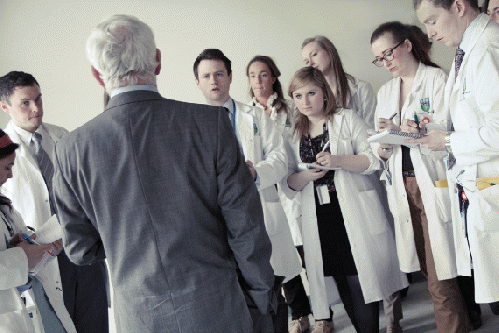There is a basic flaw in the commonly held concept of Medicine that lies at the root of all the maladies prevailing in the field of medical education and health care. Successful practice of Medicine consists of about 2/3rd body medicine and 1/3rd mind-body and mind-body-spirit medicine. But only the 2/3rd component of body medicine is generally recognized as Medicine. The remaining 1/3rd is considered, if at all, under alternative medicine. While body medicine is based on structure and is therefore objective and easily teachable, mind-body medicine and mind-body-spirit medicine are more subjective and picked up by doctors after years of practical experience.
Medical colleges with their present curriculum can teach only the 2/3rd component; the rest of 1/3rd is mostly self learnt by students and doctors through observation of peers and teachers who teach by setting an example. If we consider this fact it becomes obvious that too much importance is being given to activities based on something that is incomplete by itself: body medicine-based examinations, specialisations, CME points, renewal of license and so on. It is appropriate to learn and update oneself about diseases of the body and their management but all such learning should be tempered by the fact that it pertains only to the 2/3rd component of Medicine. To be successfully utilized, this knowledge needs to be combined with the remaining 1/3rd component that is learnt through subjective experience. That is to say medical knowledge to be complete needs to be combined with a positive and empathetic approach towards the patient. Such a wholesome approach towards the patient not only treats the patient better but helps create better doctor-patient (or patient's attendants) relationship, avoids potential conflict and indirectly helps healing.
The incomplete and ignorant notion of Medicine that is widely prevalent not only complicates management by making its application mechanical but also results in Medicine being taught in a mechanical manner based on a curriculum that is built mainly on body medicine. The doctors thus produced, unless they are exposed to wholesome teachers, tend to behave more like machines lacking in empathy. Inappropriate glorification of body medicine encourages unnecessary investigations, escalates cost and allows third parties to take control. Instead of a wholesome approach towards patients, approaches catering to various disparate interests have come to determine medical education and health care delivery. Modern hospitals tend to become more like workshops, patients seen more as study materials and the disease burden as well as students aspiring to become doctors - fields to be harvested. Correction of the basic flaw should start with widespread recognition of the incomplete nature of grossly teachable and evaluable medicine. The regulatory authorities should try to add completeness to medical education by emphasising the neglected 1/3rd component of Medicine and make the wholesome medical teacher the fulcrum of all learning.
At the entry point, entrance exams to UG/PG courses should in addition to testing proficiency in the required subjects, also test the candidates' ability to feel for and render help to those in need of it. How this can be done is a matter that needs help from educationists. Mere logic based tests in the concerned subjects as at present will only worsen the malady and chaos. Being more subtle and subjective, the 1/3rd component is easily side-lined. Corrective measures need wisdom and vision. Just as diseases like obesity, diabetes mellitus and dyslipidemia need basic life style modification to be meaningfully treated, the maladies in the field of medical education and health care require basic conceptual modification. Healing by doctors should, as a rule, imply healing of the mind, body and the spirit and not merely the body.






